
Every day, Minnesotans drive more than 123 million miles—the distance from Earth to the sun, and halfway back again. These miles add up to a massive amount of greenhouse gas emissions, making cars and trucks the number one source of climate pollution for the transportation sector in our state.
While Minnesota is working to curb the number of vehicle miles traveled by increasing investments in electrification and in public transit, bicycle, and pedestrian infrastructure, more must be done to reduce the emissions from vehicles on the road. That’s where clean car standards come into play. By following the path of 14 other states and Washington, D.C., in adopting these stricter-than-federal tailpipe emissions standards, Minnesota will take a significant step towards meeting our greenhouse gas emissions reduction goals while improving air quality and laying the foundation for more electric vehicle (EV) adoption.
Remind me, what are clean car standards?
Clean car standards are essentially tailpipe emissions standards that are stricter than federal standards and that auto manufacturers—not auto dealers—are required to follow. These standards have two parts:
The Low-Emission Vehicle (LEV) rule. This sets limits on tailpipe pollution for auto manufacturers, requiring them to deliver new passenger vehicles to the Minnesota market that produce lower emissions of greenhouse gas and other air pollutants. This is accomplished mainly through fuel efficiency gains, and the auto industry has been successfully meeting this standard since 2012.
The Zero-Emission Vehicle (ZEV) rule. This requires auto manufacturers to deliver more passenger vehicles with zero tailpipe emissions for sale in Minnesota, increasing each year. States that have adopted the ZEV standard have better access to more makes and models of EVs than Minnesota, which is a key reason why Clean Cars Minnesota is needed.
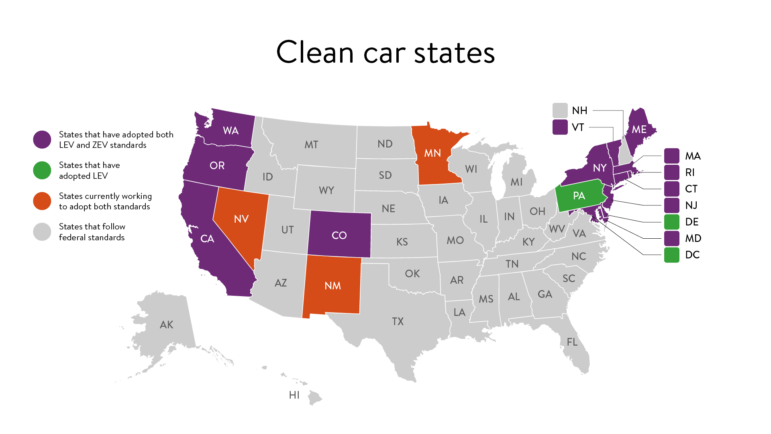
Fresh Energy has long supported clean car standards. In fact, our efforts on this initiative began over thirteen years ago when we supported clean cars legislation advanced by Representative Melissa Hortman and Senator John Marty. We knew then what we’re adamant about now: that clean car standards would not only protect Minnesotans’ health and improve air quality—particularly for communities of color and under-resourced communities—but also increase Minnesotans’ options for electric vehicles, protect our pocketbooks at the gas pump and slash maintenance costs, help grow the state’s economy, and position Minnesota as a place for EV innovation.
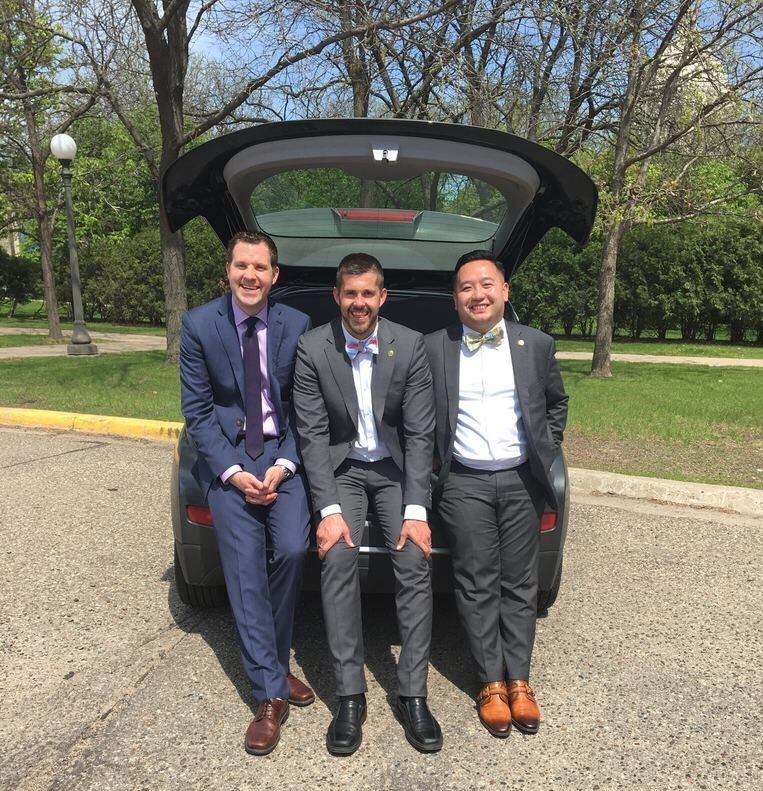
Above all, clean car standards pave a clear path to reduced greenhouse gas emissions from transportation. Fresh Energy has worked for many years to build a strong science- and research-based case for this commonsense policy in Minnesota. In 2015, after extensive analysis and alongside a broad coalition of advocates Fresh Energy concluded that clean car standards would help Minnesota meet its 2007 Next Generation Energy Act greenhouse gas reduction goals, and that the Minnesota Pollution Control Agency (MPCA) should initiate an administrative rulemaking process to adopt the standards. This process was aided by the Obama administration’s creation of a new national program for tailpipe emissions standards, which harmonized regulations between the three regulatory bodies overseeing such standards—the U.S. Environmental Protection Agency (EPA), the National Highway Traffic Safety Administration (NHTSA), and the California Air Resources Board (CARB)—and simplified compliance for auto manufacturers.
No road is long with good company
Buoyed by strong partners, Fresh Energy waded through multiple attempts to quash progress on vehicle emissions standards, both at the national and state levels. Our determination to see Minnesota adopt clean car standards only grew in 2015 when many automakers began walking back agreements they had made to reduce greenhouse gas emissions and improve fuel economy under the Obama administration. But automakers found themselves swimming against the current. The transportation sector was entering a critical period of reformation. Advocates and policymakers were ready to talk seriously about how to cut greenhouse gases from transportation emissions. This became even more of an imperative in 2017, when transportation ousted the power sector (electricity production) from its lengthy reign as the biggest source of U.S. greenhouse gas emissions.
With this growing national awareness driving us forward, and the former presidential administration actively rolling back tailpipe emissions standards, Fresh Energy and our partners continued pursuing opportunities to advocate for clean car standards in Minnesota with community and state leaders—beginning with the Dayton governorship and extending to the current Walz administration. We witnessed our fair share of doubt and critique, but, as Fresh Energy executive director Michael Noble puts it, “We knew Minnesota could be a tipping point state—the first in the Midwest to catalyze more widespread adoption of carbon-neutral transportation. And, with Clean Cars, we had a clear rule and clear method that had already been successful in many other states.”
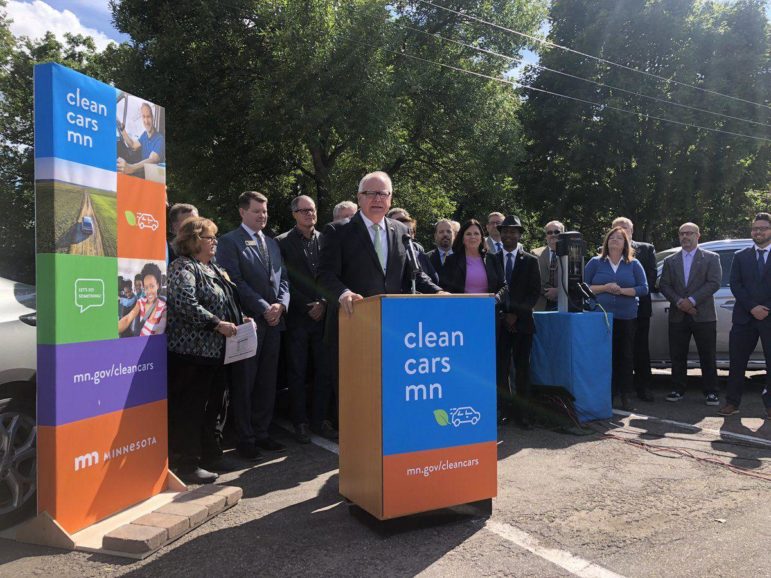
And we were successful.
Governor Walz announced his bold vision for Clean Cars Minnesota in September of 2019, directing the MPCA to adopt clean car standards. That directive launched the lengthy rulemaking process the state has since undergone, culminating in the Administrative Law Judge recommending on May 7, 2021 that the proposed rules be adopted.
Over the years, the Clean Cars Minnesota campaign has gathered attention and support from a diverse network of organizations and people—with much of the initial groundwork beginning at Fresh Energy. “The first definitive ‘yes’ on this campaign came from Governor Walz,” said executive director Michael Noble. “So, kudos to him for saying ‘yes’ to cleaner air, healthier communities, and more consumer choice for Minnesotans.”
Where the public and policy intersect
As expected, major opposition forces emerged. Big Oil and the Minnesota Auto Dealers Association joined the fray by launching a well-funded misinformation campaign targeting rural regions of the state and pulling levers to scuttle the policy at the Minnesota Legislature by getting bills introduced to revoke the ability of the MPCA to regulate emissions from transportation—a key responsibility of the agency since its creation in 1967.
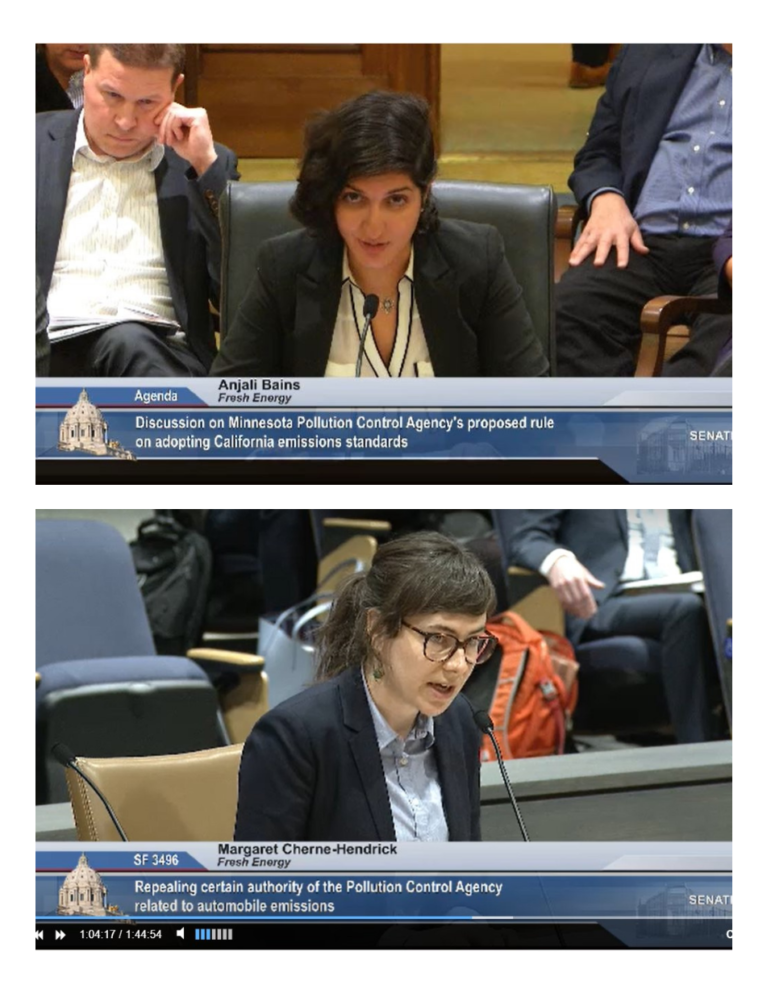
These efforts to sow doubt, coupled with perceived changes to the status quo, prompted many Minnesotans and political leaders to raise questions about clean car standards—and Fresh Energy staff, with coalition partners, were there to answer them. For the past two years, Fresh Energy has been active on the public front debunking common myths about Clean Cars Minnesota, providing legislator and Chamber of Commerce education, fielding local and national media interviews, keeping the public updated on what to expect throughout the rulemaking process, conducting informational and fact-checking webinars on what the standard would require, and illustrating the clear benefits of a policy like this time and time again.
Running in tandem with Fresh Energy’s public communications and outreach campaign, policy staff launched an extensive effort to defend and advocate for the standards at the legislative, administrative, and agency levels. For years, our staff has provided expert research, analysis, and on-the-record comments to MPCA—all while giving public testimony at the Minnesota Legislature defending clean car standards and the role of the MPCA in regulating vehicle emissions. Paired with our public outreach efforts, this technical policy work built strong engagement across Minnesota in the clean cars rulemaking process.
Clean Cars Minnesota cruises forward
Despite the challenges presented by COVID-19, Minnesotans rallied virtually at the request of the MPCA to express their thoughts about the standards. Almost 10,000 people participated in MPCA informational meetings and engaged in the rulemaking process, including nearly 800 who submitted official comments on the standards via Fresh Energy’s innovative online portal. In the end, the opposition’s well-funded misinformation campaign failed to sway the Administrative Law Judge against a policy that so clearly benefits Minnesotans. Commonsense policy prevailed.
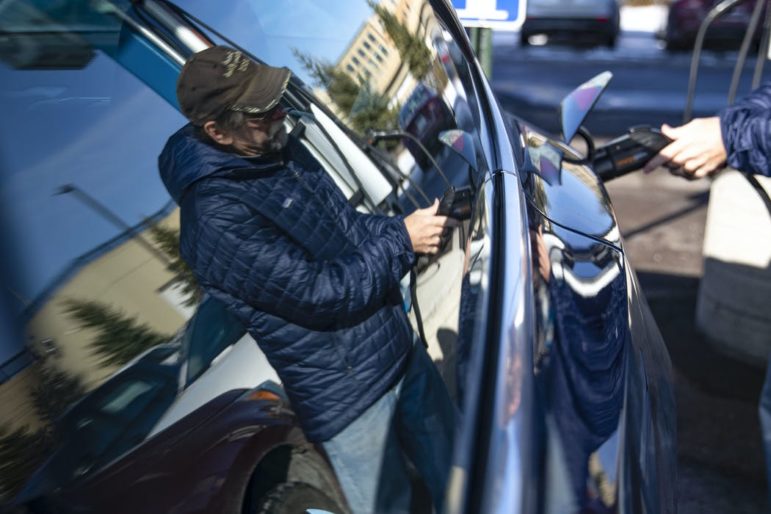
As we mark the official end of this process, we look back over 13 years—when our efforts to establish a clean car standard in Minnesota initially began—and are thrilled with how those initial efforts evolved into such an impactful and successful campaign to drive policy change. We’re proud to have had so many collaborative, innovative partners in this effort, and we’re proud of how Fresh Energy worked with those partners to pave new paths when we hit roadblocks on the journey.
Throughout this whole process the facts remained crystal clear: Clean car standards are a significant and multifaceted policy that will positively impact everyone who calls Minnesota home by cleaning up our air and reducing environment- and health-harming emissions from transportation—all while giving consumers more choices and centering electric innovation in our state.
But the road doesn’t end here. On July 26, 2021, Minnesota officially became the newest clean cars state when Governor Walz signed Clean Cars Minnesota into law. But the journey continues as we work to further encourage EV adoption and accessibility in Minnesota, for passenger vehicles and beyond. Our senior clean transportation manager Anjali Bains puts it this way: “Clean Cars Minnesota whetted our appetite for what’s possible here. The experience gleaned and relationships built poise us to swiftly decarbonize the rest of the transportation sector and transform the way we move our people and our goods so that our health and climate are protected and our communities thrive.”
